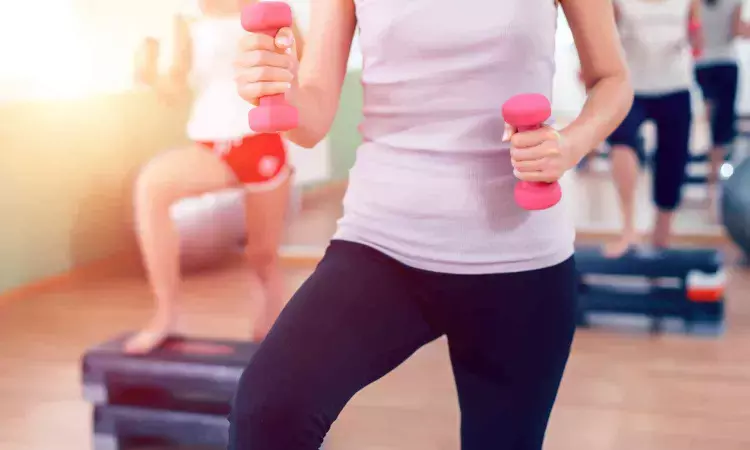- Home
- Medical news & Guidelines
- Anesthesiology
- Cardiology and CTVS
- Critical Care
- Dentistry
- Dermatology
- Diabetes and Endocrinology
- ENT
- Gastroenterology
- Medicine
- Nephrology
- Neurology
- Obstretics-Gynaecology
- Oncology
- Ophthalmology
- Orthopaedics
- Pediatrics-Neonatology
- Psychiatry
- Pulmonology
- Radiology
- Surgery
- Urology
- Laboratory Medicine
- Diet
- Nursing
- Paramedical
- Physiotherapy
- Health news
- Fact Check
- Bone Health Fact Check
- Brain Health Fact Check
- Cancer Related Fact Check
- Child Care Fact Check
- Dental and oral health fact check
- Diabetes and metabolic health fact check
- Diet and Nutrition Fact Check
- Eye and ENT Care Fact Check
- Fitness fact check
- Gut health fact check
- Heart health fact check
- Kidney health fact check
- Medical education fact check
- Men's health fact check
- Respiratory fact check
- Skin and hair care fact check
- Vaccine and Immunization fact check
- Women's health fact check
- AYUSH
- State News
- Andaman and Nicobar Islands
- Andhra Pradesh
- Arunachal Pradesh
- Assam
- Bihar
- Chandigarh
- Chattisgarh
- Dadra and Nagar Haveli
- Daman and Diu
- Delhi
- Goa
- Gujarat
- Haryana
- Himachal Pradesh
- Jammu & Kashmir
- Jharkhand
- Karnataka
- Kerala
- Ladakh
- Lakshadweep
- Madhya Pradesh
- Maharashtra
- Manipur
- Meghalaya
- Mizoram
- Nagaland
- Odisha
- Puducherry
- Punjab
- Rajasthan
- Sikkim
- Tamil Nadu
- Telangana
- Tripura
- Uttar Pradesh
- Uttrakhand
- West Bengal
- Medical Education
- Industry
New mums advised to do two hours of moderate to vigorous exercise a week for improving well being: Study

New mums should be strongly encouraged to begin clocking up at least two hours of moderate to vigorous intensity physical activity such as brisk walking and muscle strengthening exercises each week in the first three months after birth, when physically able, to improve health and well-being, say experts in a new guideline published by the British Journal of Sports Medicine.
They also strongly recommend daily pelvic floor muscle training to reduce the risk of urinary incontinence, and taking steps to improve sleep quality and duration.
In the weeks and months following birth (postpartum period), risk of depression, weight retention, sleep disorders, diabetes, and cardiovascular disease increases, especially after pregnancy complications. But clear guidance on how to appropriately engage in postpartum physical activity is severely lacking.
To address this, a panel of expert researchers and clinicians set out to provide up to date, evidence-based guidance on physical activity, sedentary behaviour, and sleep throughout the first year after childbirth.
Their recommendations are based on in-depth analyses of evidence from 574 studies and are relevant to those who have recently given birth, irrespective of breastfeeding status, gender, cultural background, disability, or socio-economic status.
After consulting with new mums, the panel selected 21 ‘critical’ and ‘important’ outcomes for analysis. These included injury, reduced breast milk quality or quantity, depression and anxiety, urinary incontinence, fear of movement, fatigue, and poor infant growth and development.
The quality and certainty of evidence for each outcome was evaluated using the GRADE system.
Based on this evidence, the panel strongly recommends that in the first 12 weeks after giving birth, new mums with no conditions or symptoms preventing them from being physically active should aim for a mix of aerobic and resistance activities (eg, brisk walking, cycling and muscle strengthening exercises) for at least 120 minutes each week, spread over four or more days of the week.
Those with underlying conditions or symptoms should seek medical advice before beginning or returning to moderate physical activity, they add. However, they stress that everyone who has recently given birth should be doing light daily activities such as gentle walking, to prevent the known harms of inactivity.
Other strong recommendations include daily pelvic floor muscle training to reduce the risk of urinary incontinence and rehabilitate pelvic floor muscles, and developing a healthy sleep routine (eg, avoiding screen time and maintaining a dark, quiet environment before bed) to support mental health.
New mums who follow this guideline, produced by the Canadian Society for Exercise Physiology, are likely to reap many health benefits, including reduced depression, urinary incontinence, and low back pain, and improvements in weight, cholesterol levels, and fatigue, with no increased risk of injury or adverse effects on breastmilk quality or quantity, they explain.
They acknowledge that meeting these recommendations may not always be possible, but say “even small steps towards achieving them will still promote physical and mental health benefits.”
And while future research will need to address gaps in the literature, they argue that these clinically meaningful benefits “strongly support incorporating consultation and guidance on movement behaviours into clinical practice for the postpartum period.”
Feedback also indicates that following these recommendations would be feasible, acceptable and equitable, and likely to incur minimal costs to individuals and health systems, while yielding significant healthcare savings.
Reference:
2025 Canadian guideline for physical activity, sedentary behaviour, and sleep throughout the first year postpartum, British Journal of Sports Medicine, DOI:10.1136/bjsports-2025-109785
Dr Kamal Kant Kohli-MBBS, DTCD- a chest specialist with more than 30 years of practice and a flair for writing clinical articles, Dr Kamal Kant Kohli joined Medical Dialogues as a Chief Editor of Medical News. Besides writing articles, as an editor, he proofreads and verifies all the medical content published on Medical Dialogues including those coming from journals, studies,medical conferences,guidelines etc. Email: drkohli@medicaldialogues.in. Contact no. 011-43720751


